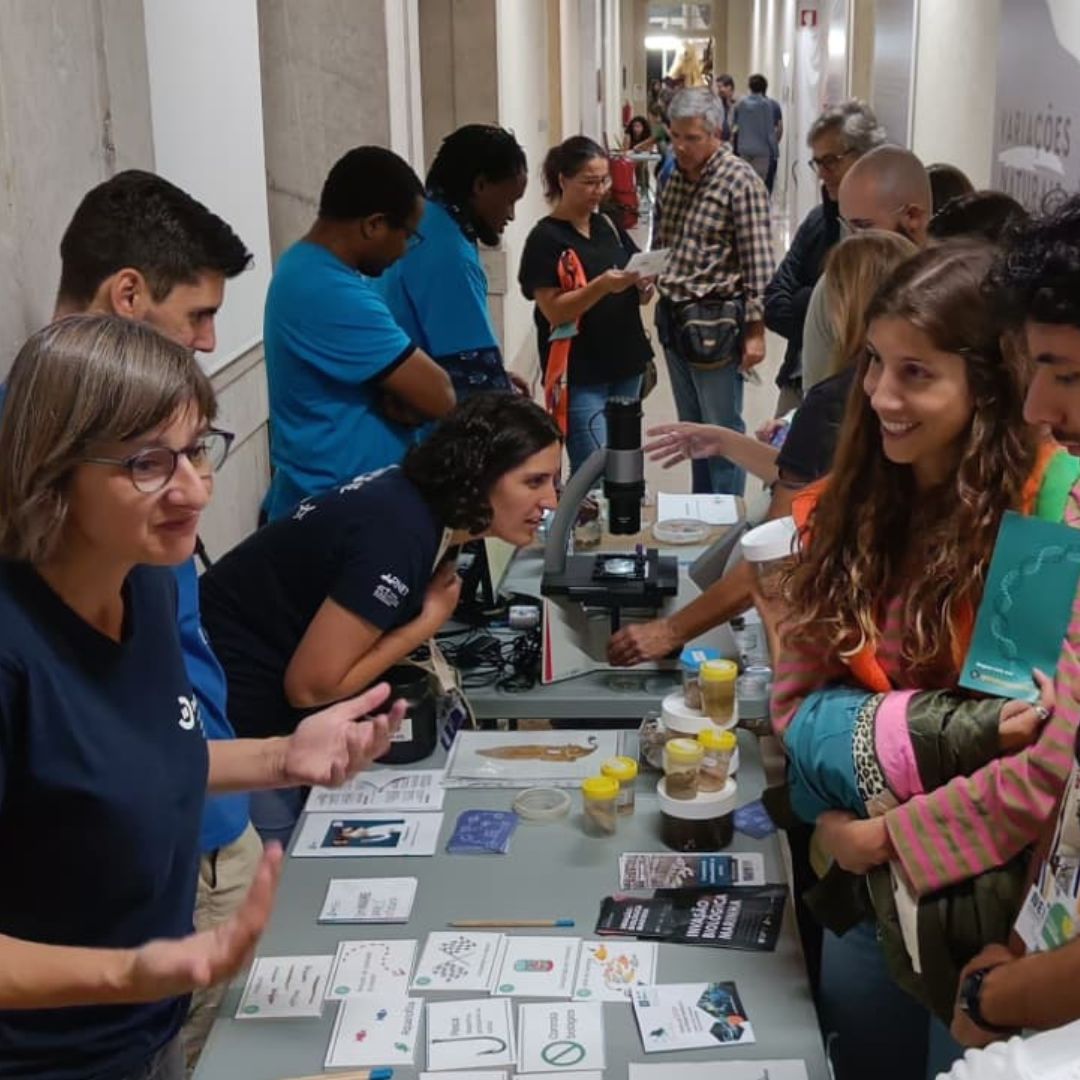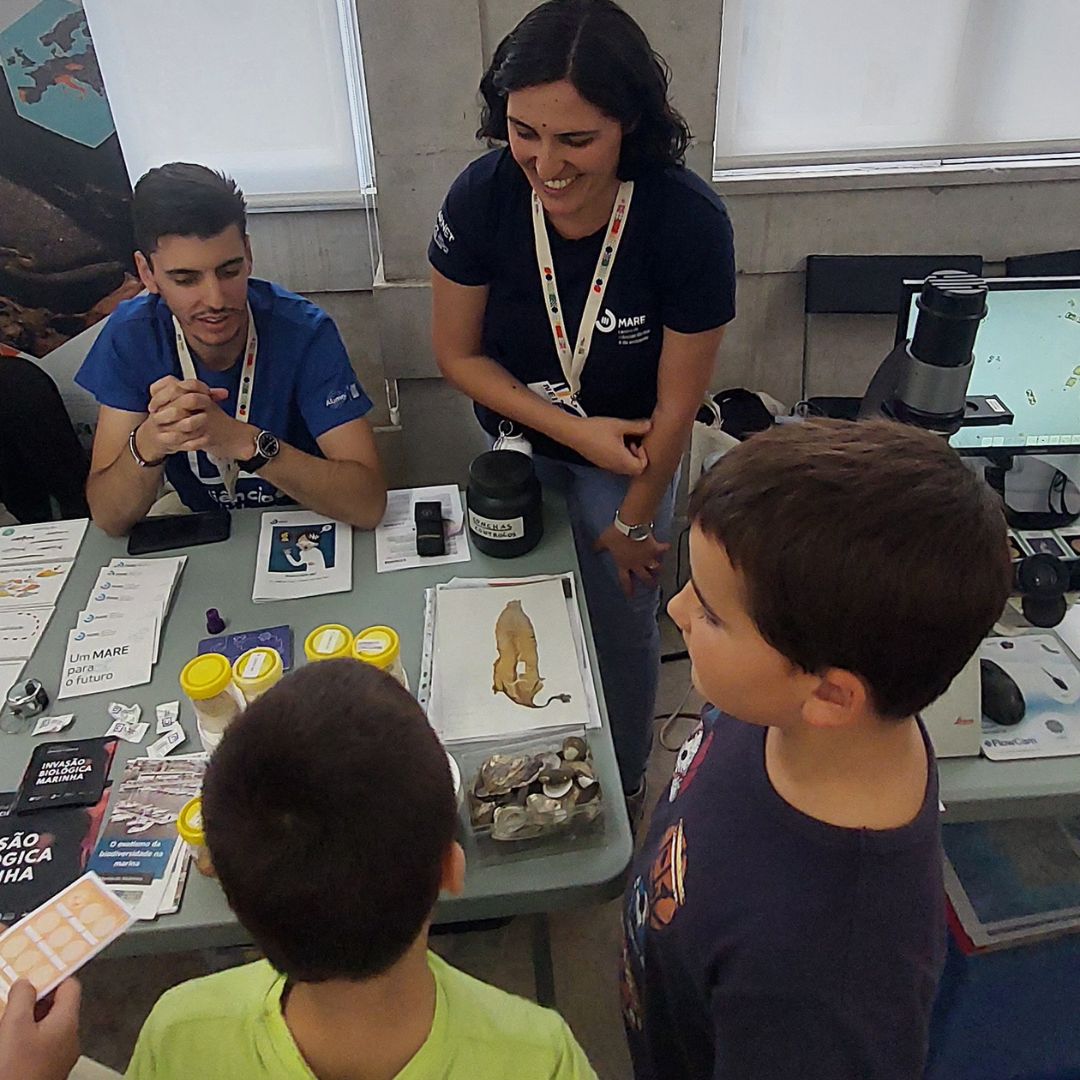MARE at the European Researchers' Night
MARE participated in another edition of the European Researchers' Night (NEI 2025), which took place on September 26th in several Portuguese cities. As part of a European initiative that seeks to bring science closer to citizens, MARE organized a series of interactive and educational activities, reaffirming its commitment to scientific dissemination and environmental awareness.
Present in Lisbon, Coimbra, Funchal, and Évora, MARE researchers hosted themed stations that sparked the curiosity of visitors of all ages. Combining hands-on experiences, educational games, scientific demonstrations, and open dialogue with the public, they were able to communicate science in an accessible, relevant, and engaging way.
"It's rewarding to communicate science in an accessible way. Through these games, we showcase complex issues, such as overfishing or pollution, in a way that captures the attention of both young and old," said MARE researcher Rita Almeida. "The games help understand that fish encounter multiple obstacles during their migration and that only with solutions like fish passages can they complete their life cycle," added researcher Filipa Silva.
The use of technology in educational environments was also a prominent feature of MARE's activities, with a focus on digital and immersive approaches in the areas of environmental history and coastal tourism. "We want to show that environmental and cultural heritage can also be experienced in digital environments, bringing science closer to the public and promoting more sustainable tourism," highlighted Rosário Bastos of MARE.
 The audience's enthusiasm was evident throughout the evening. Many visitors described the NEI as a unique opportunity to gain a firsthand understanding of the work of Portuguese research centers. "This is my second year at the NEI. I'm curious to learn about what the research centers are developing. I like seeing new developments and better understanding the scientific work being done in Portugal," said Carolina Delgado. Archaeology student Eurico Carvalheira, meanwhile, expressed surprise at the presence of invasive species in the country's rivers: "I've always wanted to come, and this year I took advantage of it. I really enjoyed learning about invasive fish species, like the European perch, which I never imagined was a problem."
The audience's enthusiasm was evident throughout the evening. Many visitors described the NEI as a unique opportunity to gain a firsthand understanding of the work of Portuguese research centers. "This is my second year at the NEI. I'm curious to learn about what the research centers are developing. I like seeing new developments and better understanding the scientific work being done in Portugal," said Carolina Delgado. Archaeology student Eurico Carvalheira, meanwhile, expressed surprise at the presence of invasive species in the country's rivers: "I've always wanted to come, and this year I took advantage of it. I really enjoyed learning about invasive fish species, like the European perch, which I never imagined was a problem."
Raising awareness of the ecological impacts caused by exotic species was also highlighted by other visitors. "I enjoyed listening to the experts talk about invasive species, the damage they cause, and the importance of eradicating some to prevent this same damage. I had no idea that freshwater mussels caused so much economic damage, so I've already learned something!" said Sara Rocha, a participant in Évora. For Pedro Brandão, a MARE researcher who led one of the stations on invasive species in aquariums, "there's been a lot of activity this year, with many people very interested; it's been a good event. We're sharing a bit about our projects on biological invasions, always trying to raise awareness about the problem."
This year, MARE's 10 years of research and impact were also highlighted, sharing the journey of a decade dedicated to knowledge production, interdisciplinary cooperation, and community engagement. The celebration served as a meeting point between the past and future of marine and environmental research in Portugal.
Participation in this initiative reinforces MARE's mission to make science more accessible, useful, and relevant to society, especially at a time when environmental challenges require greater awareness and collective engagement.
The European Researchers' Night continues to be one of the largest science communication events in Portugal, and MARE, with its decentralized action focused on aquatic ecosystems, actively contributes to building bridges between scientific knowledge and informed citizenship.
